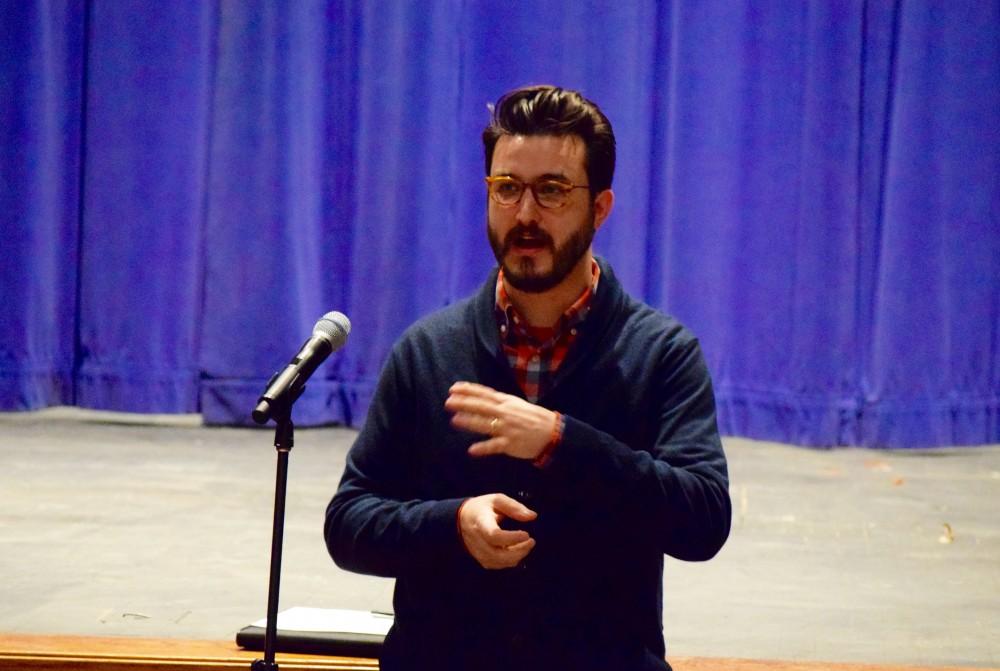Career Explorations Seminars present options for students in the arts

GVL / Courtesy – Caitlin Cusack Sam Strater
Feb 22, 2016
Musicians, artists and actors: These are careers in the arts. At least, these are the careers people usually think of. The Career Exploration Seminar began on Feb. 15. with a lecture given by Grand Valley State University alumnus Sam Strater to help music students learn about the variety of options for their future careers.
Assistant professor Sookkyung Cho said she started the seminar series after realizing that many of her students didn’t know about all of the career opportunities available to them after receiving an undergraduate degree in music.
“While talking to some of my students here, I’ve noticed that when they talk about grad school or career options they often talk about being a performer or being a teacher, but not really anything else,” Cho said. “There are just so many kinds of things that you can do, you just have to be more creative. These three people started with undergraduate music degrees; there is no one set path for these careers, they were all creative and paved the way for themselves.
Strater, the first in the series of the three professionals Cho scheduled to speak with students, works as the director of artistic administration at the Cincinnati Pops Orchestra. While Strater graduated from GVSU with a bachelor of arts degree in music and eventually went on to get his master’s degree in clarinet performance from the University of Colorado Boulder, he said he doesn’t often play his instrument and instead focuses on the business side of music.
“My talent is the architecture,” Strater said. “Although I could play my instrument, what really fulfills me is knowing that music is being made as well as it could be made and that I make the decisions that allow the orchestra to continue to prosper.”
Cho said she hopes students were able to see the importance of careers in the business of music. She said that often students view jobs in administration as jobs for people who do not play well, but this is not the case.
“(Strater’s) philosophy is that he wants to ensure that this art form continues to thrive, while leaving the job to people that actually belong on the stage,” Cho said. “There is a lot of artistic importance in positions like his. He actually programs concerts with conductors, all this music business is important because music wouldn’t thrive without them.”
Strater said that he realized he wanted to go into arts administration during graduate school when he found that he wanted spend more time working with people. He said he also enjoyed the idea of avoiding auditioning for an orchestra and competing with anywhere from 50 to 200 other musicians for the same position.
“I was realizing that I was going to not be a performer for a number of reasons and this was a way for me to be a part of the musical process,” Strater said. “Frankly my talents were more well-suited for administration. I found that when I was in administration I got to work with people all day and it was a more social experience.”
One aspect of arts administration being a social experience, Strater said, is understanding what music the audience would like to hear. One challenge facing orchestras today is keeping audience members coming back and buying tickets. Strater said he works to balance art with business by programming pieces for the orchestra both that the audience will like and that are challenging for the performers.
“For a long time, my perspective was (that) the art is the art and the audience will listen to what I tell it to listen to, but it doesn’t work that way necessarily,” Strater said. “It’s not all about the art, and it’s not all about the money, there’s a balance in the middle.
“As artists, it’s obviously really important to make art and to have a passion for what you do, but also to eat. And to pay your rent. It’s finding that sort of leading edge precipice where I’m doing the things that I know I’m supposed to be doing for this art form and I’m also doing this thing that I know people will come to see. It’s as much about the audience as it is about making your art.”
The career explorations seminar series will continue at 3 p.m. on Feb. 29 with a Skype interview with GVSU alumnus Brian Balmages who is the director of instrumental publications for the FJH Music Company Inc. For more information, visit www.gvsu.edu/music.

























